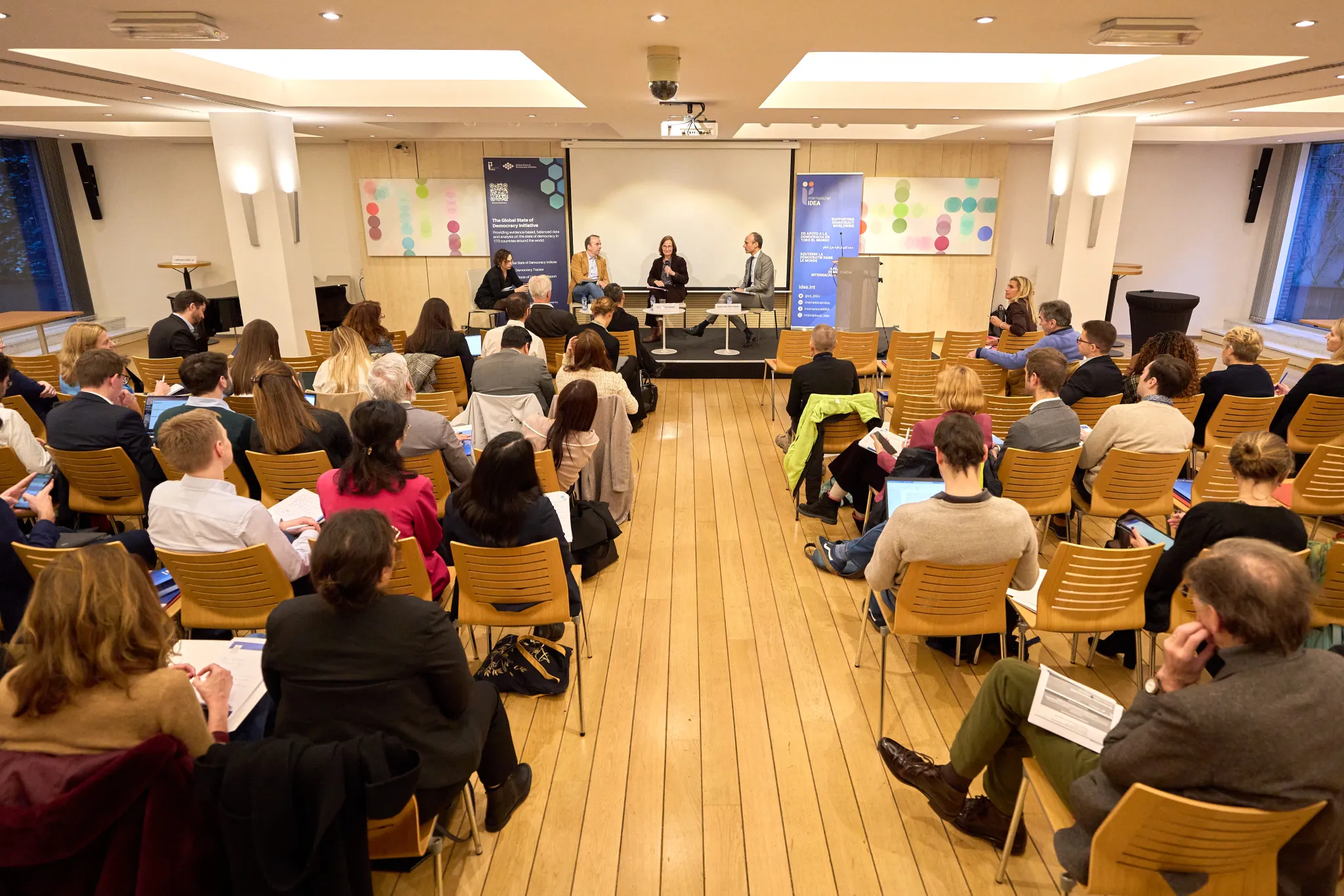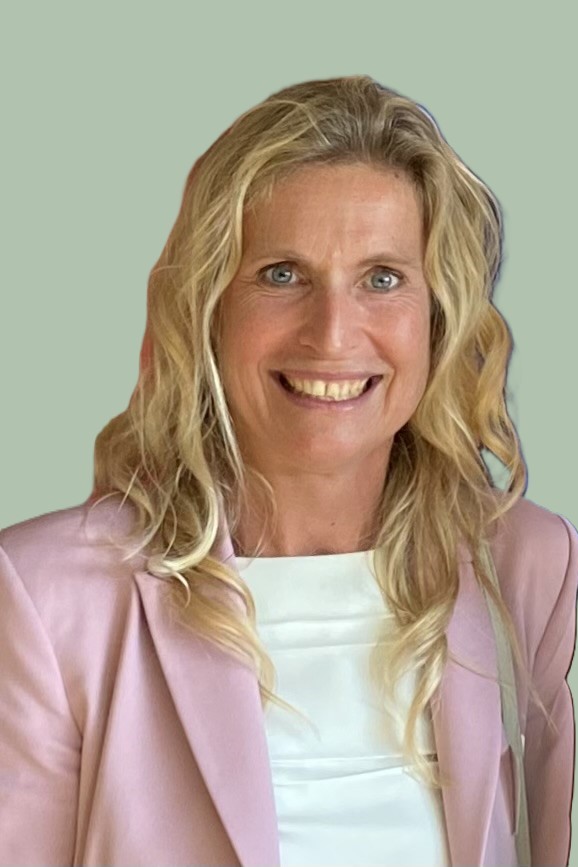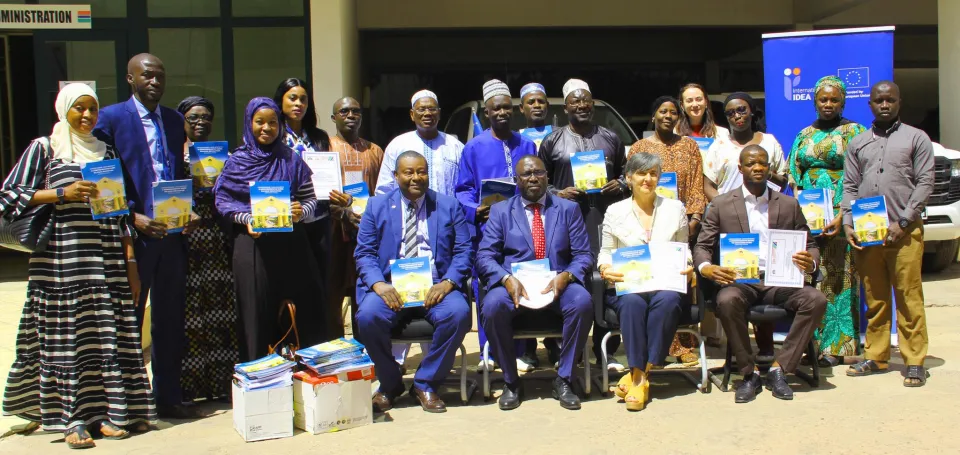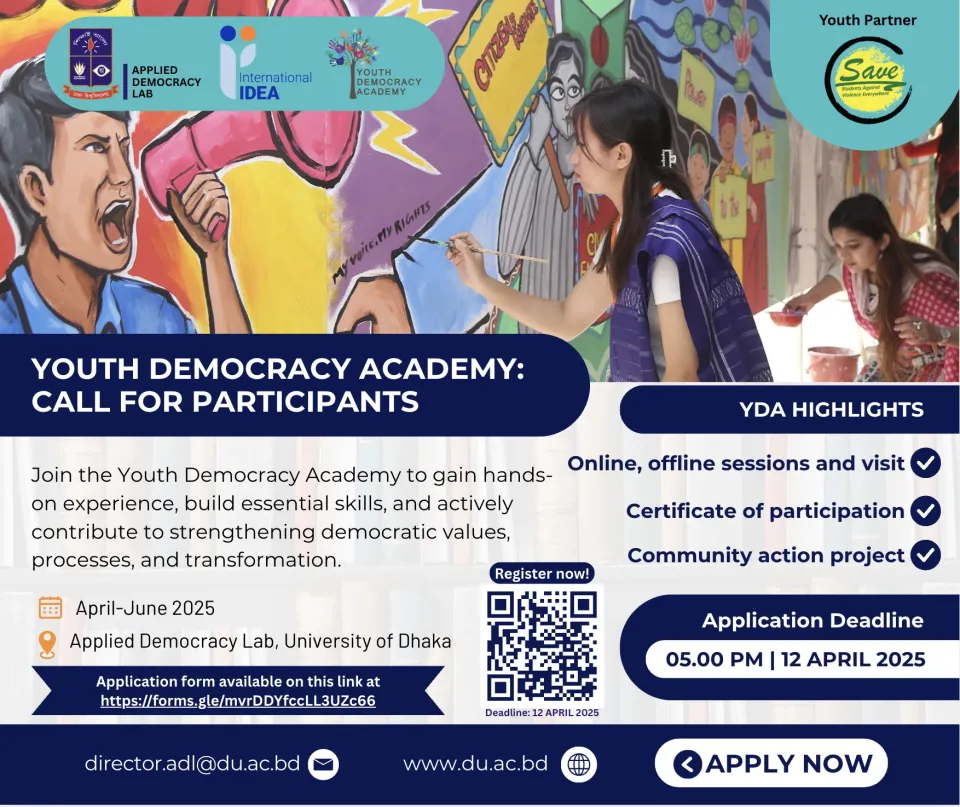Taking Stock: The Global State of Democracy 2023 Brussels Launch Event on 17 November

“Democracy is our most valuable asset. Our defense against extremism, dictatorship and war. Our most precious gem that shines well in the hands of the people." – H.E. Hadja Lahbib, Belgian Minister of Foreign Affairs at the Global State of Democracy Report Launch in Brussels.
Introduction
On 17 November 2023, International IDEA together with its co-host, the Mission of Norway to the European Union (EU), presented this year’s edition of the Global State of Democracy (GSoD) Report, titled “The New Checks and Balances”, and discussed the key findings and recommendations in the presence of the wider Brussels democracy community composed of over 70 representatives from EU institutions, national and sub-national missions and authorities, think thanks, partner organisations and academic institutions at the Norway House in Brussels.
Highlights of this year’s GSoD Brussels Launch Event included two keynote speeches by H.E. Hadja Lahbib, Belgian Minister of Foreign Affairs, and Dr Adam Bodnar, Elected Senator of the Polish Senate, followed by a panel discussion with esteemed speakers from different backgrounds who explored the role of countervailing institutions in safeguarding and advancing democracy in relation to the EU.

Opening Session
H.E. Anders H. Eide, the Ambassador of Norway to the EU welcomed the participants and emphasized the important role of democracy, especially in today’s world, which is characterized by military conflicts and a global decline in democracy and the rule of law. Referring to the recent parliamentary elections in Poland, Ambassador Eide pointed out the important role and influence that a strong civil society can have in countering democratic backsliding.

In his welcoming remarks, Sam Van der Staak, International IDEA’s Director for Europe, emphasized the symbolic importance of the annual GSoD Report in Brussels, at the heart of EU politics and the EU’s central role in supporting democracy both within its borders and globally. He commented on the upcoming European Parliament which will take place amidst stagnating democratic progress even in long-established democracies, and on the need for effective cooperation between the EU and its key democratic partners to counter democratic backsliding.


Marilyn Neven, the Master of Ceremonies of the event, unveiled the agenda of the discussion and highlighted the GSoD Report’s central theme. While introducing the speakers, she pointed at how democracy actors, including the European Union, can navigate the important challenges, protect societies from autocratization, and reinforce democratic values.
Keynote address No. 1
The floor was then passed on to H.E. Hadja Lahbib, Minister of Foreign Affairs of Belgium, who spoke about international law and democratic values being increasingly under threat, and the sad reality that half of the world’s population currently lives in a country where civil rights are not respected. “The world is increasingly polarized and divided into two opposing blocs, one advocating a democratic order based on personal freedoms and human rights, and the other one with authoritarian leaders seeking to undermine democracy”, she said. The clash between the two blocs is illustrated by the experiences in countries such as Ukraine, Moldova and Georgia, but also within the EU itself, where foreign interference is attempting to weaken unity and solidarity between its Member States. Minister Lahbib pointed at the responsibility of the EU and its Member States to protect democracy and strengthen their societies, for example by implementing the recommendations of the Conference on the Future of Europe. Very importantly, the Minister announced that strengthening democracy would be among Belgium’s top priorities during its Presidency of the Council of the EU. She looked forward to the European Commission’s proposal on the Defense of Democracy package as an important milestone ahead of the European elections in 2024.

Highlights of the GSoD 2023 Report
Dr Seema Shah, Head of International IDEA’s Democracy Assessment Unit, first introduced the conceptual framework behind the GSoD report, which is based on four main categories: Representation, Rights, Rule of Law, and Participation. All categories are measured against a set of indicators, comprising a total of 157 indicators of democratic performances in 173 countries from 1975 to the end of 2022. Dr Shah continued by presenting the Report’s key findings, which show that democracy has contracted in all regions of the world, with country-level declines outpacing progress for the sixth consecutive year. In Europe, the most common decline is in the Rule of Law, including in high and medium performing countries. However, Dr Shah noted that the latest data also contained some bright spots. First, there is more progress than decline in the Absence of Corruption, particularly in Africa, Asia, and in Europe, with Dr Shah citing Moldova and Ukraine as positive examples. Secondly, in terms of Participation, the data shows that it is not uncommon for Participation to persist in an environment that is under serious threat in several ways, such as in the exercise of Civil Liberties. In conclusion, Dr Shah derived policy recommendations from the Report’s findings: First, elections and legislatures need to be strengthened by transforming the electoral process into a collaborative process where electoral management bodies work with the media, courts, and other countervailing institutions to improve the credibility and legitimacy of electoral processes. Second, respect for Civil Liberties must be re-emphasized, with regular assessments of states’ protection of these rights and with strong and independent mechanisms to receive and respond to reports of civil rights violations. Third, national governments must re-emphasize the independence of the judiciary by consulting with judiciaries and judicial service bodies to jointly establish mechanisms to report, investigate, and punish acts that compromise the integrity of the judiciary. Finally, the executive, legislative, and judicial branches should maintain regular mechanisms to communicate with the public and meaningfully engage civil society in this regard.

Keynote address No. 2
The second Keynote speaker was Dr Adam Bodnar, Elected Senator of the Polish Senate, who provided insights in the recent political developments in Poland and how the Polish democratic system could be repaired, with the support of EU institutions. He cited the Polish case as a prime example of how the collective efforts of countervailing institutions – in this case political activists, lawyers, judges, and ordinary citizens – can lead to halting democratic backsliding and paving the way for the revival of democracy and the rule of law. Dr Bodnar explained how informal countervailing institutions have complemented existing formal institutions such as the Ombudsman, the Supreme Audit Office, and the Polish Senate, and through protests, strategic litigation, and lobbying have managed to overcome autocratic forces in Poland, ultimately leading to the landmark parliamentary elections in Poland on 15 October 2023. In addition, Dr. Bodnar emphasized that other countries can learn from the Polish case, from which he derived four conditions for democratic change: 1) a strong civil society; 2) free media and free speech; 3) investment in the judiciary and in independent academia; and 4) international pressure from non-governmental and governmental organizations to continue the fight for democracy.

Panel discussion
The subsequent panel discussion zoomed in on “The EU’s Role in Safeguarding Democracy – Unpacking the Importance of Democratic Institutions” and featured Erica Gerretsen, Director in the European Commission’s Directorate-General for International Partnerships, Paul Maassen, Chief Country Support at Open Government Partnership (OGP), and Sarah Wheaton, Chief Policy Correspondent of POLITICO Europe. The discussion was moderated by Sam van der Staak, International IDEA’s Director for Europe. The discussion centered on the causes of the deteriorating state of democracy around the world, which can be traced back to increasing inequality in the world and dwindling trust between governments and citizens. The panelists saw a way forward in intensifying the fight against corruption and making the political decision-making process more inclusive by enabling more effective participation of civil society, especially youth representatives, to improve the quality of democracy.

Erica Gerretsen highlighted that the European Commission is already the largest financial supporter of civil society organizations in the world and that its support is mainly focused on Eastern and Central Europe and Africa. According to Gerretsen, the biggest challenge is to show citizens that democracy delivers and why it is therefore better to live in a democratic society. In doing so, the European Commission works closely with countervailing institutions in the respective countries and contexts. In terms of the European Commission’s approach, Gerretsen referred to the objectives of Team Europe Democracy (TED) and Global Gateway as key EU initiatives.

Paul Maassen expanded on the work of OGP, considering the work on anti-corruption measures as essential to regain the trust of citizens and effectively counter democratic backsliding. Furthermore, experience has shown that reforms become more ambitious and their outcomes better when national governments meaningfully involve civil society organizations.

Sarah Wheaton talked about media as an important countervailing institution and her personal experiences as a journalist working both in the US and in the political context of the EU. She reported on a rather dismissive attitude of the political leadership and citizens’ lack of trust towards the press. Regarding the corruption scandal surrounding some members of European Parliament, known as ‘Qatargate’, Wheaton criticized the lack of transparency on the part of the Belgian authorities and the declining interest of the public in this context.

Closing remarks
Christian Leffler, Chair of International IDEA’s Board of Advisers, captured the main messages of the report and discussions by way of conclusion, highlighting the need to look beyond formal institutions and to explore how informal countervailing institutions make democracy work. “Civil society organizations, political activists, and the media are indispensable for monitoring and improving the formal institutions of democracy”, he said. Furthermore, democracy is all about participation, inclusion, accountability, and constant dialogue which necessitates education and critical thought. With regard to the often-cited trade-off between values- and interest-based policies, Leffler pointed out that there is no inherent contradiction between a values-based and an interest-based policy. In his view, a European Union without values would be little more than a trade association. He concluded by making a few suggestions to participants on how they could approach the report and work with its findings.

This article is written by Konstantin Kümmerle, Intern EU Liaison at International IDEA.




